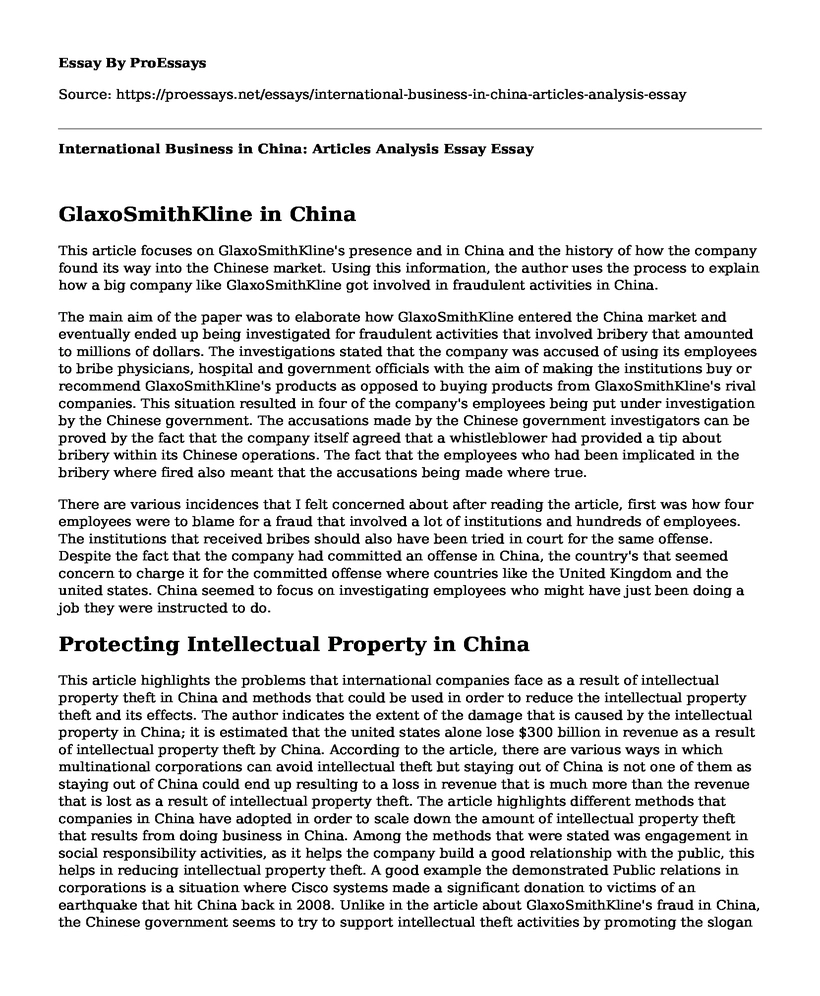GlaxoSmithKline in China
This article focuses on GlaxoSmithKline's presence and in China and the history of how the company found its way into the Chinese market. Using this information, the author uses the process to explain how a big company like GlaxoSmithKline got involved in fraudulent activities in China.The main aim of the paper was to elaborate how GlaxoSmithKline entered the China market and eventually ended up being investigated for fraudulent activities that involved bribery that amounted to millions of dollars. The investigations stated that the company was accused of using its employees to bribe physicians, hospital and government officials with the aim of making the institutions buy or recommend GlaxoSmithKline's products as opposed to buying products from GlaxoSmithKline's rival companies. This situation resulted in four of the company's employees being put under investigation by the Chinese government. The accusations made by the Chinese government investigators can be proved by the fact that the company itself agreed that a whistleblower had provided a tip about bribery within its Chinese operations. The fact that the employees who had been implicated in the bribery where fired also meant that the accusations being made where true.
There are various incidences that I felt concerned about after reading the article, first was how four employees were to blame for a fraud that involved a lot of institutions and hundreds of employees. The institutions that received bribes should also have been tried in court for the same offense. Despite the fact that the company had committed an offense in China, the country's that seemed concern to charge it for the committed offense where countries like the United Kingdom and the united states. China seemed to focus on investigating employees who might have just been doing a job they were instructed to do.
Protecting Intellectual Property in China
This article highlights the problems that international companies face as a result of intellectual property theft in China and methods that could be used in order to reduce the intellectual property theft and its effects. The author indicates the extent of the damage that is caused by the intellectual property in China; it is estimated that the united states alone lose $300 billion in revenue as a result of intellectual property theft by China. According to the article, there are various ways in which multinational corporations can avoid intellectual theft but staying out of China is not one of them as staying out of China could end up resulting to a loss in revenue that is much more than the revenue that is lost as a result of intellectual property theft. The article highlights different methods that companies in China have adopted in order to scale down the amount of intellectual property theft that results from doing business in China. Among the methods that were stated was engagement in social responsibility activities, as it helps the company build a good relationship with the public, this helps in reducing intellectual property theft. A good example the demonstrated Public relations in corporations is a situation where Cisco systems made a significant donation to victims of an earthquake that hit China back in 2008. Unlike in the article about GlaxoSmithKline's fraud in China, the Chinese government seems to try to support intellectual theft activities by promoting the slogan "for China by China". this is a major setback for the multinational corporations.
Managing Corporate Crisis in China: Sentiment, Reason, and Law
As the title states, the article addresses the recent issues that affect multinational corporations in China and the reasons these issues have come up. According to the article, the underlying reason why multinational companies are experiencing a crisis in China is the Chinese perspective of crisis that involves three perspectives which includes sentiment, reason, and law. These three-perspective set China apart from other countries during crisis management I corporations. A good example that was given is a case where Apple replaced faulty phones with the new one but retained the back cover in order to prevent a situation where the new reissued products also meant that the warranty was renewed. Such a move would have been considered as legal in other countries but this did not work in China as customer sentiments carry the same weight as the law. As stated in the article these three perspectives have been part of the chines culture centuries before the industrial revolution. In my opinion, the situation in China creates unfair business for the international corporations as they have to adhere to customers sentiments that in other situations might not be correct. For instance, in the Apple case, it was okay for the customers to use the old warranty period as they had only paid for the iPhone once. But the company ended up extending warranties for the phones and this would have possible negative implications for the company's finances.
Cite this page
International Business in China: Articles Analysis Essay. (2022, Apr 07). Retrieved from https://proessays.net/essays/international-business-in-china-articles-analysis-essay
If you are the original author of this essay and no longer wish to have it published on the ProEssays website, please click below to request its removal:
- Case Analysis Example: Life Tech versus Promega Corporation
- Questions and Answers on The Companies Act of 2006
- The Concepts of Power in International Business Negotiations Paper Example
- Essay Sample on US Modern History
- Paper Example on Funny KFC Ad Captivates Viewers
- Paper Example on Environmental Management for Sustainable Business Practices
- Essay Sample on U.S. Economy: Government Intervention vs. Laissez-Faire







